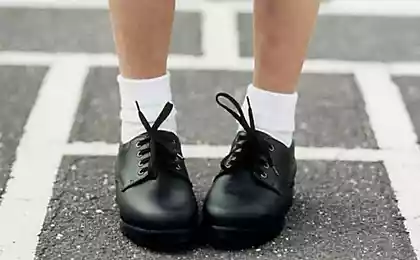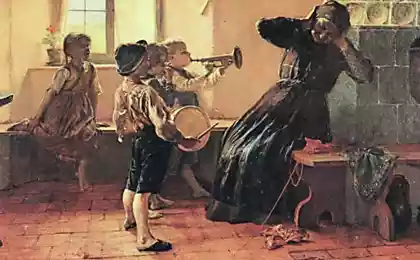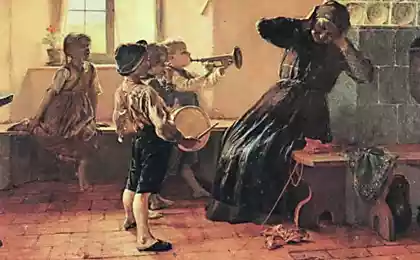599
10 reasons to send your child to a music school
Ninety six million two hundred ninety one thousand five hundred forty seven
Despite the fact that the child is out of tune screaming Cheburashka song, and hearing it does not have; despite the fact that the piano is nowhere to put it, and grandma could not carry a child "to music"; despite the fact that the child even once – English, Spanish, section for swimming, ballet and other, and other ...
There are good reasons to overcome all that and still teach music, and those causes need to know modern parents:
1. To play is to follow the tradition. Music taught all aristocrats, Russian and European. To play music is gloss, glitter and glamour, the apotheosis of secular manners. Duke Ellington started playing the piano because playing around guy always got girls. Well, playing around girls? Attention, parents of brides!
2. Music classes will educate and discipline: to practice must be constantly, regularly and without interruption. Winter and summer, weekdays and holidays. Almost with the same tenacity with which Champions train in the gym and at the rink. But, unlike sports heroes, playing the piano, you can't break nor neck, nor foot, nor even a hand.
Attention, strict parents! Music is a character without the risk of injury: as well.
3. Engaging music, the child develops mathematical skills. It is spatial thinking, getting the right keys, manipulating abstract sound shapes, memorizing music, and he knows that in a musical piece is like a mathematical proof: either to subtract or add! Not casually albert Einstein played the violin, and Professor of physics and Professor of mathematics at Oxford account for 70% of members of the University music club.
4. Music and language are twin brothers. They were born after each other: first, senior – music; then the younger – verbal speech, and in our brain they continue to live side by side.
Phrases and sentences, commas and dots, questions and exclamations have in music and in speech.
Playing and singing better than they say and write, are easier to remember foreign words faster learn grammar. Music lovers-writers, Turgenev, Stendhal, Boris Pasternak and Leo Tolstoy, Jean-Jacques Rousseau, and Romain Rolland, each of whom knew one foreign language, are recommended all future polyglot music.
Attention wise parents of future journalists and translators! In the beginning was the Word, but before that was Sound.
5. Music is structural and hierarchical: major works break up into smaller parts, which in turn are divided into small topics and segments consisting of smaller phrases and motives. A natural understanding of the musical hierarchy facilitates understanding of the computer is also completely hierarchical and structured.
Psychologists have proved that young musicians, students of the famous Shinichi Suzuki, even if not too successful in the development of musical hearing and memory, but spared his peers on the level of structural thinking. Attention, pragmatic parents of future IT engineers, system administrators and programmers! Music leads directly to the heights of computer science; not accidentally, the Microsoft company prefers employees with music education.
6. Music classes develop communication skills, or as they are called today, communication skills. Over the years of study the child-musician acquainted with the gallant and friendly Mozart, hairy and athletic Prokofiev, wise and philosophical Bach, and other very different musical persona. While playing, he will have to reincarnate and to convey to the public their nature, manner feel, voice, and gestures.
Now there is one step up to a talent Manager. Because for him perhaps the most important is to understand people and using their understanding to control them. Attention ambitious parents of future founders of business empires! Music goes from heart to heart, and the most powerful weapon of a top Manager – a disarming smile "good guy".
7. The musicians soft-hearted and courageous at the same time. According to psychologists, musicians-men with men, ladies, and musicians-women and stand steadfast as men. The music softens manners, but for it to succeed, you have to be courageous. Attention, sagacious parents, waiting to be of assistance and support in old age! Children who studied music, at the same time sympathetic and patient, ready to give their aging parents the same "glass of water".
8. Music lessons are taught to "get involved." Musicians are less afraid of the terrible words deadline – the deadline. In music school you can't do it tomorrow or the week ahead credit schemes and great gig. The position of the artist on stage will make you have maximum availability "on request", and a child with such experiences will not overwhelm serious examination, an interview at the job and responsible report.
Attention, anxious parents! Music lessons in childhood is the maximum shutter speed and artistry for life.
9. Music classes educate small "Caesars", able to do many things at once. Music helps to navigate in multiple concurrent processes: for example, reading from the sheet the pianist, immediately does several things – remembers the past, looks to the future and controls the present.
Music flows at its own pace, and read from the sheet may not break, relax and take a breath. Similarly, the air traffic controller, computer operator, or a stock broker watching multiple screens simultaneously listens and transfers information across multiple phones. Music teaches to think and live in several directions.
Attention, overworked and tired parents! The child musician is easier than You to run for multiple life paths and everywhere come first.
10. And finally, music is the best way to success in life. Why? Cm. paragraphs 1-9.
No wonder that the musical past is marked by many celebrities:
— Agatha Christie my first story written about why it is difficult to play the piano on the stage;
— Condoleezza rice, by contrast, likes to play in public in her dazzling concert dress
— Bill Clinton I am sure that without the saxophone would never have become President.
Look at successful people in any field, ask not whether they were engaged in childhood music, even if only briefly, even though without much zeal? Of course, studying. And we have 10 reasons to follow their inspiring example.
Kirnarskaya D. K.
Russian musicologist, Vice-rector of the Russian Academy of music named. Music, music psychologist, Professor, doctor of arts, doctor of psychological Sciences; founder and scientific Director of the production Department FRAMES them. Gnessin state musical College (Russia), President of ANO "Talents of XXI century".
Source: vesti.gliera.com/?p=612
Despite the fact that the child is out of tune screaming Cheburashka song, and hearing it does not have; despite the fact that the piano is nowhere to put it, and grandma could not carry a child "to music"; despite the fact that the child even once – English, Spanish, section for swimming, ballet and other, and other ...
There are good reasons to overcome all that and still teach music, and those causes need to know modern parents:
1. To play is to follow the tradition. Music taught all aristocrats, Russian and European. To play music is gloss, glitter and glamour, the apotheosis of secular manners. Duke Ellington started playing the piano because playing around guy always got girls. Well, playing around girls? Attention, parents of brides!
2. Music classes will educate and discipline: to practice must be constantly, regularly and without interruption. Winter and summer, weekdays and holidays. Almost with the same tenacity with which Champions train in the gym and at the rink. But, unlike sports heroes, playing the piano, you can't break nor neck, nor foot, nor even a hand.
Attention, strict parents! Music is a character without the risk of injury: as well.
3. Engaging music, the child develops mathematical skills. It is spatial thinking, getting the right keys, manipulating abstract sound shapes, memorizing music, and he knows that in a musical piece is like a mathematical proof: either to subtract or add! Not casually albert Einstein played the violin, and Professor of physics and Professor of mathematics at Oxford account for 70% of members of the University music club.
4. Music and language are twin brothers. They were born after each other: first, senior – music; then the younger – verbal speech, and in our brain they continue to live side by side.
Phrases and sentences, commas and dots, questions and exclamations have in music and in speech.
Playing and singing better than they say and write, are easier to remember foreign words faster learn grammar. Music lovers-writers, Turgenev, Stendhal, Boris Pasternak and Leo Tolstoy, Jean-Jacques Rousseau, and Romain Rolland, each of whom knew one foreign language, are recommended all future polyglot music.
Attention wise parents of future journalists and translators! In the beginning was the Word, but before that was Sound.
5. Music is structural and hierarchical: major works break up into smaller parts, which in turn are divided into small topics and segments consisting of smaller phrases and motives. A natural understanding of the musical hierarchy facilitates understanding of the computer is also completely hierarchical and structured.
Psychologists have proved that young musicians, students of the famous Shinichi Suzuki, even if not too successful in the development of musical hearing and memory, but spared his peers on the level of structural thinking. Attention, pragmatic parents of future IT engineers, system administrators and programmers! Music leads directly to the heights of computer science; not accidentally, the Microsoft company prefers employees with music education.
6. Music classes develop communication skills, or as they are called today, communication skills. Over the years of study the child-musician acquainted with the gallant and friendly Mozart, hairy and athletic Prokofiev, wise and philosophical Bach, and other very different musical persona. While playing, he will have to reincarnate and to convey to the public their nature, manner feel, voice, and gestures.
Now there is one step up to a talent Manager. Because for him perhaps the most important is to understand people and using their understanding to control them. Attention ambitious parents of future founders of business empires! Music goes from heart to heart, and the most powerful weapon of a top Manager – a disarming smile "good guy".
7. The musicians soft-hearted and courageous at the same time. According to psychologists, musicians-men with men, ladies, and musicians-women and stand steadfast as men. The music softens manners, but for it to succeed, you have to be courageous. Attention, sagacious parents, waiting to be of assistance and support in old age! Children who studied music, at the same time sympathetic and patient, ready to give their aging parents the same "glass of water".
8. Music lessons are taught to "get involved." Musicians are less afraid of the terrible words deadline – the deadline. In music school you can't do it tomorrow or the week ahead credit schemes and great gig. The position of the artist on stage will make you have maximum availability "on request", and a child with such experiences will not overwhelm serious examination, an interview at the job and responsible report.
Attention, anxious parents! Music lessons in childhood is the maximum shutter speed and artistry for life.
9. Music classes educate small "Caesars", able to do many things at once. Music helps to navigate in multiple concurrent processes: for example, reading from the sheet the pianist, immediately does several things – remembers the past, looks to the future and controls the present.
Music flows at its own pace, and read from the sheet may not break, relax and take a breath. Similarly, the air traffic controller, computer operator, or a stock broker watching multiple screens simultaneously listens and transfers information across multiple phones. Music teaches to think and live in several directions.
Attention, overworked and tired parents! The child musician is easier than You to run for multiple life paths and everywhere come first.
10. And finally, music is the best way to success in life. Why? Cm. paragraphs 1-9.
No wonder that the musical past is marked by many celebrities:
— Agatha Christie my first story written about why it is difficult to play the piano on the stage;
— Condoleezza rice, by contrast, likes to play in public in her dazzling concert dress
— Bill Clinton I am sure that without the saxophone would never have become President.
Look at successful people in any field, ask not whether they were engaged in childhood music, even if only briefly, even though without much zeal? Of course, studying. And we have 10 reasons to follow their inspiring example.
Kirnarskaya D. K.
Russian musicologist, Vice-rector of the Russian Academy of music named. Music, music psychologist, Professor, doctor of arts, doctor of psychological Sciences; founder and scientific Director of the production Department FRAMES them. Gnessin state musical College (Russia), President of ANO "Talents of XXI century".
Source: vesti.gliera.com/?p=612
Little-known uses for lemon in Oriental medicine
Dozens of years we lie about milk and its properties...























